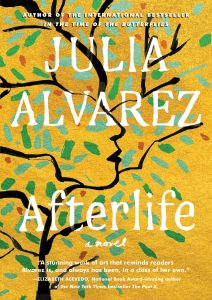 Published by Algonquin Books 7 April 2020
Published by Algonquin Books 7 April 2020
272pp, hardback, $25.95
Reviewed by Elsbeth Lindner
Steering a course between the Scylla of her husband’s sudden death and the Charybdis of her own rebirth as a widow, Antonia Vega, the central character of Alvarez’s wise, deft and often gently wry new novel, dickers constantly with choices – self-improvement or selfishness, her own priorities or others’?
A retired English professor immersed in her grief and loneliness, Antonia is often to be found in what she calls ‘the word thicket’, a place of double-meaning, wordplay and quotation, from the likes of Wordsworth, Tolstoy, Rilke, Auden and many more. Alvarez plays the same game with the duality of her title. Is this a novel about saintly departed Sam’s afterlife – and influence – or Antonia’s? Is the key question for Antonia, ‘What would Sam do?” (usually the right or better thing) or, ‘If I try to be like you, who will be like me?’ This last query, posed by a Jewish therapist who spent time in a concentration camp, is bizarrely but importantly resonant to Hispanic Antonia whose response to dilemmas is generally an insular, often sceptical process of cerebral digestion.
Her roots are in the Dominican Republic. Her parents are dead but her three sisters – Tilly, Izzy and Mona – are very much alive and the sisterhood is a vibrant and significant component of the story. When possibly bi-polar Izzy goes missing, the other three must collaborate in their efforts to find her, a process simultaneously loving, comical, histrionic, combative and resourceful. Alvarez is no stranger to stories of sisters.Her debut, How the Garcia Girls Lost Their Accents, followed four sisters from the Dominican Republic adjusting to life after immigration to the US , while In the Time of the Butterflies traced a different Hispanic sisterhood, that one based on true and tragic history.
Antonia, meanwhile, has another problem, one which she must face alone, at home in rural Vermont. Her solitude there has been breached by the uninvited complications of an undocumented worker on a neighboring farm. Now Antonia becomes involved in a couple’s personal drama and pregnancy, pulling her into both the twilight world of illegal immigration and also a strange, unexpected territory of protective feelings.
Antonia’s afterlife is a journey full of questions and quandaries, good choices and others, dilemmas of the moral and personal kind which connect at multiple levels with America’s essential issues of the moment. For what, and whom, are citizens, employers, law-enforcement officers and family members responsible? How far should any one person go, to help another, related or not? Alvarez juggles all this with humor and restraint, drawing forth a portrait of a female sensibility addressing some of the most fundamental questions of social engagement.
And yet, for all its interiority, this is a book that slips down like water. Alvarez experience and humanity translates into a soft-spoken but resonant examination of the words we think and say, and the deeds we do on the strength of them.
